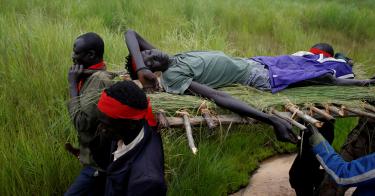The U.S. government announced on Friday a unilateral arms embargo on the war-torn East African country of South Sudan.
The embargo will not end the terrible fighting in the world’s newest country, now at war for the majority of its existence, but it should make it harder for South Sudan’s armed groups to devastate the country as efficiently.
The embargo is also another signal that the Trump administration is inclined to impose real costs on South Sudanese leaders for their crimes. (The U.S. had also sanctioned three senior South Sudanese government officials back in September 2017.)
This embargo is a dramatic break from the failed policy to which the U.S. has doggedly clung for far too long.
The South Sudanese civil war began in December 2013, when President Salva Kiir accused his former vice president, Riek Machar, of launching an attempted coup. (Subsequent African Union and U.S. investigations found no evidence for the claim.)
The struggle for political power, which grants those who have it the opportunity to loot state resources, quickly metastasized into a tribal struggle.
Since then, the war has become one of the most devastating in Africa. It features ethnic cleansing and has caused intermittent famine and some of the world’s highest displacement rates.
About 4 million South Sudanese—nearly one-third of the population—have fled their homes. No one knows for sure what the civilian death toll is, but some experts estimate it could be comparable to the civilian toll in Syria’s civil war.
The U.S., perhaps the most ardent supporter of South Sudan’s 2011 independence, at the outbreak of the war rightly supported international mediation efforts. The string of peace processes that followed, however, were farces. Neither warring side negotiated in good faith nor wanted peace badly enough to make the agreements work.
In all, Kiir and Machar, or their proxies, signed at least 11 agreements vowing to seek peace, all of which they broke almost immediately.
Despite the overwhelming evidence that the combatants were unserious about peace, the U.S. continued to support the negotiations while issuing laments and vague warnings of consequences for further bad behavior from the warring parties. (Between December 2013 and January 2017, the U.S. State Department and National Security Council released around 80 such statements.)
After three years of this, the U.S. finally went to the United Nations (U.N.) Security Council to try to get an arms embargo. The effort failed, however, prompting public glee from the South Sudanese government.
Friday’s unilateral arms embargo is welcome and right. More needs to be done, however, to restore American credibility in South Sudan and to demonstrate to the violent parties that they will pay a progressively heavier price if they continue their crimes.
The U.S. will have to pressure other countries, particularly the neighbors—through which many of the South Sudan-bound weapons flow—to cooperate with the embargo to make it as effective as it can be.
Despite the previous failure to secure a U.N. arms embargo, American diplomats should also try again to build momentum for one. It may be that the U.S. can build enough Security Council support for an embargo that those countries that resisted it previously will become too embarrassed to continue their opposition.
The war will become less appealing to South Sudan’s leaders only if they bear a personal cost, and there are ways to do that, as I outlined in a report last year.
Such measures should include cutting all diplomatic ties with the South Sudanese government; building a comprehensive sanctions regime targeting anyone fomenting violence; expelling back to South Sudan, and freezing the assets of, any relatives of the leadership who have benefited from the pillaging of the country; and requiring any U.S.-funded organizations operating in South Sudan to reasonably ensure that their operations do not benefit any of the warring groups.
The South Sudanese war is one of the worst conflicts on the planet today. The U.S.’s failure under the previous administration to break from a futile negotiation process, to impose substantive penalties on the South Sudanese leadership for flouting U.S. warnings, and to exact a price for the barbaric crimes both sides are committing likely emboldened the combatants.
The new arms embargo is another step toward correcting these mistakes.
This piece originally appeared in The Daily Signal



